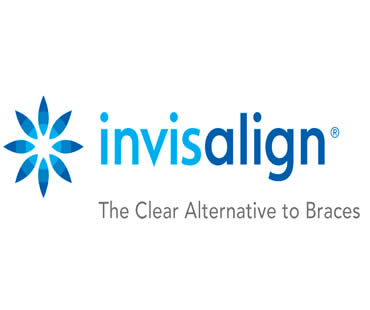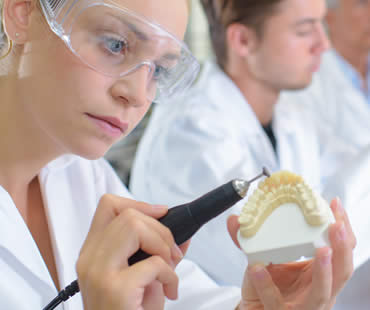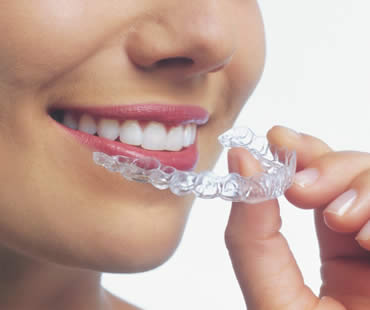
Being a teenager can be difficult, and being a teen whose smile could use some improvement can be even more difficult. If your teen suffers from gapped, crooked, crowded, or misaligned teeth, you may be looking into Invisalign with your teen’s orthodontist as a smile solution.
In the past, metal braces were the standard for teens, leading to “metal mouth” smiles and the worry that food is caught there during lunch or after snacks. Metal braces can lead to even more self-consciousness for your teen. Using Invisalign will lead to the same results as traditional metal braces. While metal braces use wires and brackets to straighten teeth, Invisalign uses clear plastic trays, allowing your teen’s process of tooth straightening to be less obvious.
The Invisalign process begins with impressions and x-rays, providing valuable information regarding the current condition of your teen’s teeth. The mold made from the impressions serves as the reference for creating the custom-made Invisalign trays. A series of trays are used, gradually altering the teeth, leading to a more comfortable straightening process.
Invisalign trays are removed before eating, eliminating the trepidation associated with eating in public with traditional metal braces. Because there is no hardware to dislodge, there are no food restrictions, and your teen may continue to enjoy whatever foods desired.
Your teen will need to have good oral hygiene habits. Flossing once a day and brushing after mealtimes or at least twice a day is best. Invisalign trays are removed prior to these activities, allowing for an ease of oral care not provided by traditional braces.
Be sure your teen wears the Invisalign trays as recommend by his or her orthodontist. In order to maximize Invisalign effectiveness, your teen must wear the trays at all times, except during mealtimes or when brushing or flossing.
If you live in the Meriden area contact us today

You may think there is nothing to be done if your smile has become unattractive due to tooth damage like chipping, discoloration, or misalignment. However, dentists offer a solution called porcelain veneers that can restore your smile and give you the confidence to show it off.
Made out of durable and natural-looking porcelain, veneers are thin shells that cover the fronts of your teeth so that imperfections are no longer visible. Problems that caused you to hide your teeth in the past will be covered up by these porcelain tops. The process for getting veneers is simple. There is no surgery or anesthesia required. Your dentist will make impressions of your teeth to enable your custom-made veneers to fit perfectly. These will be sent to a laboratory for veneer development, which can take several weeks. Your dentist may need to prepare your teeth by removing a small amount of enamel, and then the veneers will be adhered to the fronts of your teeth with a secure resin.
There are other options for handling various kinds of tooth damage, but veneers may be the simplest and most durable choice. For example, chipped teeth can be improved with dental crowns, but this can be a more invasive procedure. Yellowed teeth can be whitened with various methods, but this is not as permanent as porcelain veneers. Durability is one of the greatest benefits of veneers, because they don’t discolor and are permanently secured to your teeth. If you properly care for them with good oral hygiene, veneers can last a lifetime.
Another major selling point for veneers is that they can exactly replicate natural teeth. Your dentist will have your customized veneers created by matching the color and shape of your face and personal features. Others may not even realize you have them, other than the fact that those who knew you before will notice your beautiful new smile. So if you are unhappy with your current appearance of your teeth and want to quit being embarrassed to smile, porcelain veneers may be just what you need.
If you need a dentist in Meriden contact us today

Dentures have been around a long time as a way to restore smiles plagued by missing teeth. They provide a solution for people who want to smile, talk, and eat as normally as possible. Unfortunately, removable dentures aren’t without issues. They can become loose or shift, making it uncomfortable to eat and talk. Messy denture adhesives are bothersome and ineffective for some patients. Therefore, advancements in dental technology have developed the option of permanent dentures.
What are permanent dentures?
Permanent, or fixed, dentures are suitable for patients missing one, two, or more teeth. The appliance is made up of a row of crowns or artificial teeth, which are connected together and the framework is supported by dental implants. The implants act like natural tooth roots, and the permanent dentures create a bite similar to natural teeth.
What are the benefits?
Fixed dentures definitely offers some advantages to removable ones. The need for messy adhesives is eliminated, and you don’t have to worry about loose or ill-fitting dentures affecting you. The force of your bite is also improved, so you can eat all kinds of foods without concern. Because a permanent upper denture doesn’t cover the roof of your mouth, your ability to taste and enjoy food is not sacrificed. This kind of denture stays in place for normal oral hygiene, so there are no special cleaning or soaking requirements. If properly maintained, permanent dentures can last for many years or even a lifetime.
Are there any disadvantages?
Permanent dentures are susceptible to oral problems like infection or inflammation because they are not removable. Also, it is possible that the crowns may require replacement in 10 to 15 years.
We treat patients from Meriden and the surrounding area

Does your child need braces, but isn’t sure about being a “metal mouth” for two or more years? Did your teen come to you and beg for some other option to traditional braces? Perhaps you’ve heard about Invisalign aligners but are wondering if they’ll work for your child. Invisalign is absolutely appropriate for your teen if all of his or her baby teeth have fallen out and adult teeth have erupted.
Invisalign provides the same results as traditional metal braces, but without the metal brackets. Concerns over eating with braces are removed with the Invisalign trays, as they come out for meals, leaving your teen free to eat any food he or she desires.
Invisalign utilizes clear plastic trays that allow the process of straightening your teen’s teeth to be less obvious and less obtrusive. Beginning with x-rays and molds, your orthodontist will make a series of trays, called aligners. These trays are worn most of the day, taken out only to eat or to be cleaned. The process of straightening happens gradually and comfortably.
It is essential during this time that the trays are worn as recommended by the orthodontist. Wearing them less than the recommended amount of time will result in slower correction, and has the potential to lengthen treatment. Have your teen continue with any established good oral hygiene habits. Brushing and flossing must continue on a regular basis, brushing twice a day at minimum and flossing before bedtime.
Being a teenager is full of difficulties, and it is during this time that teens are at their most self-conscious. Adding metal braces to this transition can make everything worse for your child, leaving him or her self-conscious about eating with friends or smiling, talking or laughing in public. Your teen’s gapped, misaligned or crowded teeth can be improved significantly with Invisalign trays. Talk to your orthodontist today to see how Invisalign can make a difference for your child.
If you need a dentist in Meriden contact us today

Having tooth pain or problems can be one of the most uncomfortable experiences possible. It is hard to ignore because it makes your whole quality of life worse. When infection or decay reaches the inner parts of your tooth, it can cause many miserable symptoms. Often the key is getting root canal treatment to save your tooth and alleviate your symptoms. Here are some warning signs that indicate you might need this type of treatment.
Severe pain:
Although not always present, severe pain sometimes occurs with a tooth that needs root canal therapy. It may be sharp, intense pain or a dull ache that won’t subside. If you experience tooth pain that is severe or lasts for several days, see your dentist for an evaluation. If root canal treatment is necessary, any pain you may have will likely disappear after a successful procedure.
Sensitivity to hot or cold:
Discomfort when consuming hot or cold items is another sign of a problem. Mild sensitivity is usually not a big deal, but actual pain when your tooth hits these temperatures may mean the tooth is in an advanced stage of trouble.
Gum tenderness or inflammation:
Swelling or tenderness is often associated with infection, although it doesn’t always mean infection is present. Your dentist can determine the seriousness of the issues and whether root canal treatment is advised. Watch for tenderness, swelling, or even a lump in the affected area.
Darkened tooth:
Discoloration is a sign that the nerves of a tooth are damaged. The tooth may become gray, black or dark yellow. Tooth discoloration is also related to trauma, damaged fillings or severe decay, so visiting your dentist for a checkup is recommended.
Gum boils:
If lesions similar to a pimple form in the gum tissues, it is called a gum boil. It is usually an accumulation of pus, which can be linked to infection. The boil may be larger or smaller at certain times, depending on the activity of the infection in your mouth. It will feel tender and can cause swelling in the area, and you may notice a bad taste in your mouth.
If you have symptoms such as these, see your dentist to learn if root canal treatment is the solution.
We treat patients from Meriden and the surrounding area

One of the greatest gifts you can give yourself is taking care of your oral health throughout your life. Practicing a consistent dental hygiene routine and maintaining regular visits to your general dentist are the best ways to increase your chances of a beautiful, healthy smile.
General dentists focus on preventive care and treating minor problems before they have a chance to worsen into serious issues. Even if you regularly brush and floss your teeth, plaque and tartar can be quick to develop. A dentist has the necessary tools and training to remove damaging deposits before they harm your smile. In addition to professional cleanings and examinations, most general dentists fill cavities, perform root canals, whiten teeth, and even offer additional cosmetic dental procedures like dental implants or veneers.
One of the main reasons for routine examinations is to identify various problems. One common issue that you want your general dentist to catch early is gum disease. When it is treated soon after it starts, you are more likely to avoid bone deterioration or tooth loss. The early stage of gum disease is called gingivitis and can be handled by your dentist with simple techniques. If it advances to periodontitis, that’s when bone or tooth loss become a possibility and more invasive procedures like scaling or root planing may be required.
Once you make your dental appointment, which is typically recommended every six months, make sure you keep your scheduled visit. Many patients fall victim to scheduling appointments and then cancelling, not realizing how important seeing your general dentist can be. If you have dental insurance, you can even use your dental benefits for examinations and treatments. This office accepts Blue Cross/Blue Shield of Louisiana, MetLife, and Cigna.
Choose a qualified general dentist and establish a long-term relationship now, so that you can enjoy your healthy and appealing smile for years to come.
If you live in the Meriden area contact us today














